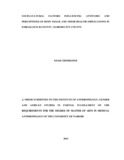Socio-cultural Factors Influencing Attitudes And Perceptions Of Body Image And Their Health Implications In Embakasi Sub-county, Nairobi City County.
Abstract
This study sought to explore the influence of socio-cultural factors on attitudes to and
perceptions of body image and its relationship to health among Embakasi Sub-County
residents in Nairobi City County. The basic question that the study sought to address was:
How do socio-cultural factors influence the attitudes to and perceptions of Embakasi Sub-
County’s residents and their health? Accordingly, the overall objective of the study was
to explore the influence of socio-cultural factors on attitudes to and perceptions of body
image and its relationship to health among the Sub-County residents. The study was
guided by the theory of phenomenology.
This study adopted a cross-sectional and exploratory research design. Data were collected
using in-depth interviews, focus group discussions, key informant interviews and
narratives. The study found that: One, body image is described in terms of shape, size and
height. Perception of what an attractive, beautiful and ideal body image is varied greatly
among the female and the male gender. Two, the study population has been influenced
largely by Western lifestyles and perceptions of body image and eating habits. Decreased
levels of exercise, sedentary lifestyles and changes in nutritional patterns characterized by
fast food lifestyles, which are as result of changes in economic and technological
advancement, predispose these residents to obesity and other related lifestyle diseases
like cancer and diabetes. Three, the research findings also indicate that socio-cultural
beliefs and attitudes to body image are intertwined with other social aspects, for instance,
body shape and size were said to determine the chances of one getting a marriage partner
x
and are also an indication of stability in marriage. Finally, such attitudes to and
perceptions of body image impacted either negatively or positively on one’s health.
The study, therefore, concludes that socio-cultural factors play a major role in shaping the
perception of and attitudes to body image. These two aspects further determine whether
one lives healthily or unhealthily. The negative impacts associated with such unhealthy
lifestyles are diseases such as cancer, diabetes and hypertension.
On the basis of the above conclusions, the study recommends that Nairobi City County
residents should be sensitized on living a healthy lifestyle and how their beliefs of body
image, dietary habits and physical activity affect their health status through health
campaigns and forums. Secondly, the research recommends the need to do more research
on the socio-cultural beliefs that influence dietary habits and general good health with
regard to body size and shape, and further identify and champion such alternative beliefs
that promote a healthy lifestyle among the residents of Nairobi City County.
Citation
Master Of Arts In Medical Anthropology Of The University Of Nairobi, 2014Publisher
University of Nairobi,
Description
A Thesis Submitted To The Institute Of Anthropology, Gender And African Studies In Partial Fulfillment Of The Requirements For The Degree Of Master Of Arts In Medical Anthropology

